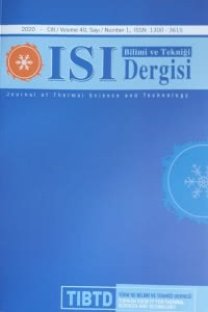A STUDY ON AIR-COOLED CHILLERS WITH EVAPORATIVELY COOLED CONDENSER FOR 3 TYPES OF CLIMATE
EVAPORATİF SOĞUTULAN KONDENSERE SAHİP HAVA SOĞUTMALI SOĞUTMA GRUBUNUN 3 İKLİM TİPİ İÇİN İNCELENMESİ
___
- Camargo J.R., Ebinuma C.D. and Silveira J.L., 2005, Experimental Performance of a Direct Evaporative Cooler Operating During Summer in a Brazilian City, Int. J. Refrig., 28, 1124-1132.
- Esiyok U., 2006, Energy Consumption and Thermal Performance of Typical Residential Buildings in Turkey, Ph.D. Thesis, University of Dortmund, Dortmund, Germany.
- Hajidavalloo E., 2007, Application of Evaporative Cooling on the Condenser of Window-Air-Conditioner, Appl. Therm. Eng., 27, 1937-1943.
- Hao X., Zhu C., Lin Y., Wang H., Zhang G. and Chen Y., 2013, Optimizing the Pad Thickness of Evaporative Air-Cooled Chiller for Maximum Energy Saving, Energ. Buildings, 61, 146-152.
- Hwang Y., Radermacher R. and Kopko W., 2001, An Experimental Evaluation of a Residential-Sized Evaporatively Cooled Condenser, Int. J. Refrig., 24, 238-249.
- Maheshwari G.P., Al-Ragom F. and Suri R.K., 2001, Energy-Saving Potential of an Indirect Evaporative Cooler, Appl. Energ., 69, 69-76.
- Sarntichartsak P. and Thepa S., 2013, Modeling and Experimental Study on the Performance of an Inverter Air Conditioner Using R-410A with Evaporatively Cooled Condenser, Appl. Therm. Eng., 51, 597-610.
- Wang T., Sheng C. and Nnanna A.G.A., 2014, Experimental Investigation of air Conditioning System Using Evaporative Cooling Condenser, Energ. Buildings, 81, 435-443.
- Yang J., Chan K.T., Xiangsheng W., Yu F.W. and Xiaofeng Y., 2012, An Analysis on the Energy Efficiency of Air-Cooled Chillers with Water Mist System, Energ. Buildings, 55, 273-284.
- Yu F.W. and Chan K.T., 2006, Improved Condenser Design and Condenser-Fan Operation for Air-Cooled Chillers, Appl. Energ., 83, 628-648.
- Yu F.W. and Chan K.T., 2011, Improved Energy Performance of Air-Cooled Chiller System with Mist Pre-Cooling, Appl. Therm. Eng., 31, 537-544.
- ISSN: 1300-3615
- Yayın Aralığı: 2
- Başlangıç: 1977
- Yayıncı: TÜRK ISI BİLİMİ VE TEKNİĞİ DERNEĞİ
Evaporatif Soğutulan Kondensere Sahip Hava Soğutmalı Soğutma Grubunun 3 İklim Tipi için İncelenmesi
Sezgi KOÇAK SOYLU, İbrahim ATMACA
Mehmet ÇELİK, Hamit SOLMAZ, H. Serdar YÜCESU, Emre YILMAZ
THERMO ECONOMICAL OPTIMIZATION OF PLATE TYPE OF HEAT EXCHANGERS FOR WASTE HEAT RECOVERY
Sonlu Bir Silindirdeki Donmanın İki Boyutlu Modellenmesi
Gülnihal ODABAŞI, Zafer DURSUNKAYA
Bir Çekici Römork Aracında Sürükleme Kuvvetinin Pasif Akış Kontrol Yöntemleri ile İyileştirilmesi
Yahya Erkan AKANSU, Cihan BAYINDIRLI, Mehmet SEYHAN
Eğik Bir Yüzeye Çarpan İkili Slot Hava Jetlerinde Basınç Dağılımlarının Deneysel İncelenmesi
Atık Isı Geridönüşümü İçin Plakalı Tip Isı Değiştiricilerinin Termo Ekonomik Optimizasyonu
Jeotermal Destekli Absorbsiyonlu Soğutma Sisteminin Termodinamik ve Ekonomik Analizi: Simav Örneği
Abtullah TUĞCU, Oğuz ARSLAN, Ramazan KÖSE, Nurettin YAMANKARADENİZ
A STUDY ON AIR-COOLED CHILLERS WITH EVAPORATIVELY COOLED CONDENSER FOR 3 TYPES OF CLIMATE
